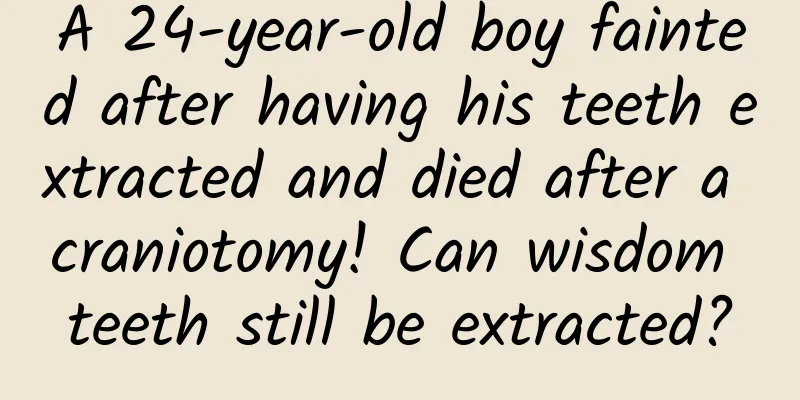A 24-year-old boy fainted after having his teeth extracted and died after a craniotomy! Can wisdom teeth still be extracted?

|
Recently, #A 24-year-old boy fainted and died after having a tooth extracted# has been widely reported. Currently, the Shenzhen Dapeng New District Education and Health Bureau is investigating and handling the matter. Image source: A social platform Many people left messages expressing their confusion, is tooth extraction so dangerous? I originally planned to have my wisdom teeth removed, but decided to postpone it a little longer... Image source: A social platform So, should wisdom teeth be removed if they don’t hurt? What will happen after the removal? Let’s talk about it today~ If wisdom teeth don’t hurt, do they need to be removed? Before asking whether to remove wisdom teeth, first ask whether you have them. In fact, not everyone has wisdom teeth. Usually, it is normal for an adult to have 28 to 32 teeth. It is possible that some people are the chosen ones who do not have wisdom teeth and do not exist. Wisdom teeth, also known as third molars, are located at the farthest and deepest part of the mouth. Image source: author If we divide the oral cavity of a normal adult into four areas: upper left, lower left, upper right, and lower right, each area will have 8 teeth. The last 8th tooth that grows is what we call the "wisdom tooth" in our mouth, and is also our third molar. The reason why wisdom teeth are called wisdom teeth, "智" means smart, is largely because they erupt after adulthood, and people always think that this is a sign of mental maturity, so they call them wisdom teeth. But in fact, wisdom teeth and IQ have nothing to do with each other except that they both have the surname "智". Even though some people never experience wisdom tooth pain, they may still need to be removed. Let me show you a photo first. These are the relatively intact wisdom teeth that I have extracted during this period, while many more wisdom teeth have actually been torn apart during the extraction process. Even so, these surviving wisdom teeth have more or less suffered from various caries and damage . Image source: Author Although most extracted wisdom teeth will cause or have caused pain to some extent, pain or not is not the fundamental reason why doctors decide whether to remove wisdom teeth . There are many reasons for tooth extraction, but the simplest way to judge is whether the wisdom tooth is straight enough . This means that even if it does not cause pain yet, the sooner the crooked wisdom teeth are extracted, the better. The reason is that crooked wisdom teeth are very difficult to clean, and food often remains, which may cause pain in the wisdom teeth and surrounding tissues. What's more serious is that it may also cause tooth decay in the molars in front of the wisdom teeth , and further cause toothache . The most serious and very common situation is that not only the wisdom teeth have to be extracted, but the second molars in front of the wisdom teeth also suffer from irreparable caries and have to be extracted together . The teeth in front of the wisdom teeth have already developed cavities, i.e. caries. Image source: author But then again, there are some particularly "well-behaved" wisdom teeth that grow neatly, fit perfectly, have no cavities, and can be cleaned at ordinary times. Then this kind of "excellent and obedient" wisdom teeth can be left as tools for us to chew food. In addition to these healthy wisdom teeth, there are also some wisdom teeth that are deeply buried in the bones and have no signs of erupting into the mouth. In this case, they can also be left alone. However, you must keep an eye on them and take precautions if there is any movement! What happens after wisdom teeth are removed? "Before, a friend of mine couldn't open his mouth for a long time after having his wisdom teeth removed. It was terrible! I won't have it removed for now!" "I saw that half of my friend's face was swollen after having his wisdom teeth removed. Not only did he feel pain, but I felt pain just looking at him..." There are also many people who do not want to have their teeth extracted. A very important reason is that they are afraid of the swelling and pain after the extraction. After tooth extraction, there is indeed a process of local swelling and pain to a greater or lesser extent. In addition, wound pain, swallowing pain, and limited mouth opening are also common during the period after tooth extraction, which is difficult to avoid. Some people even have systemic cold symptoms, such as fever, soreness and weakness in the limbs, etc. Copyright images in the gallery. Reprinting and using them may lead to copyright disputes. After all, as a surgery, trauma is inevitable. However, if the following care and symptomatic measures are taken, most of these discomforts can be alleviated and disappear within a week : ① Avoid eating within 3 hours after tooth extraction and before the anesthetic wears off to avoid irritating the wound and causing bleeding. ②Within 24 hours after tooth extraction, you can use an ice pack to cool your cheek, which will effectively reduce bleeding, swelling and pain. However, you should pay attention to continuous and intermittent ice application during the operation, with a single application of 10 to 20 minutes, and intervals in between to avoid frostbite. ③If swelling, pain, or bleeding occurs after tooth extraction, take medication according to the doctor's advice. ④ After tooth extraction, oral hygiene should be maintained. You can start brushing your teeth and rinsing your mouth 24 hours later to prevent infection. If there are stitches, they can be removed after one week. ⑤ Eat a light diet after tooth extraction, and avoid hard or hot food. Your diet will almost return to normal one week after tooth extraction. However, severe swelling and pain require a return visit to the dentist. For example, if the mouth is almost open , only a finger can be inserted, and intravenous anti-inflammatory and swelling treatment may be necessary; severe pain that is ineffective with painkillers, often accompanied by a foul odor , indicates that a "dry socket" has occurred after surgery, which requires debridement and disinfection under local anesthesia, and the wound needs to be treated and waited for to heal again. In short, it is better to have a short pain than a long pain. Although wisdom tooth extraction is a long-term solution, sometimes the fear of short-term discomfort is an important reason that prevents patients from going to the dentistry department to see a doctor for wisdom tooth removal. In fact, as long as you prepare well before the operation and follow the precautions after the operation, the short-term pain is completely controllable. Planning and production Author: He Jianliang, Chief Physician of General Dentistry, Second Affiliated Hospital, Zhejiang University School of Medicine Reviewer: Qin Man, Chief Physician of Pediatrics Department, Peking University Hospital of Stomatology Planning丨Yinuo Editor: Yinuo |
<<: Are you addicted to cats and dogs? Beware of the "hidden killers" in your pets
Recommend
What advertising resources does Meitu have?
After the full opening of Meitu Information Flow,...
Video account sales bonus project, complete tutorial from getting started to placing orders
Video account sales bonus project, complete tutor...
Ruofeng Popularity Leader Special Training Camp, accurately grasp the popular leader's detonation point Baidu Cloud Download
Ruofeng Popularity Leader Special Training Camp, ...
Interstellar "eaters", cosmic version of baby "diapers"... How does space travel "fly" to ordinary people's homes?
Aerospace technology is an important manifestatio...
Attention! A bee is approaching you...
On a lazy afternoon, the visit of a bee by the wi...
8,000-word article reviewing the development of the short video industry
In 2020, short videos will undoubtedly still stan...
14 high-definition image websites to make your article pictures worry-free - for new media operation editors
As the saying goes, a good horse deserves a good ...
How much does it cost to produce the Lu'an Aquatic Products mini program? How much is the production cost of Lu'an Aquatic Products Mini Program?
WeChat Mini Program is an application that users ...
Ancient landmasses swirl, foreign visitors come to visit... What has the Earth experienced in the long 4.6 billion years?
Map: Zhou Aojun Reviewed by: Zhao Xuting, Zhao Zi...
These two male humpback whales, what are you doing | Nature Trumpet
Welcome to the 54th issue of the Nature Trumpet c...
National Healthy Lifestyle Action Day丨These 9 seemingly lazy behaviors are actually very healthy!
Today is the National Action Day for Healthy Life...
People who lack sleep will have thicker arms and legs? If you don’t believe it, look at these 3 pieces of evidence!
Doctors from West China University of Political S...
China Passenger Car Association & CAM: Passenger car market product competitiveness index is 91.1 in November 2020
The Automobile Market Research Branch of the Chin...
Small flaws in iOS native image tagging that you may not have noticed
As we use smartphones for longer periods of time ...
Mao Xiaobai: Using video traffic to sell niche audio for cash, 5 videos a day to make money without supervision
Exclusive small project, the gameplay is first re...









